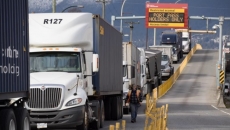OTTAWA - More than 880,000 Canadians work in industries at risk of decline or closure in the global transition to clean energy, a new analysis says.
The Canadian Institute for Climate Choices is warning in its publication Sink or Swim, that if these industries and federal and provincial governments don't acknowledge that change is coming and prepare for it, there could be devastating consequences.
"This transition is coming irrespective of decisions in Ottawa, or even decisions at provincial levels," said Dale Beugin, vice president of research at the institute.
"This transition is coming from factors outside of Canada's control. So really, it's all about what can the country and what can we do at all orders of government to prepare ourselves for that shift that is making its way to our shores no matter what."
The report identifies several vulnerable sectors, including oil and gas extraction and industries that support that, emissions-intensive manufacturing, transportation, equipment manufacturing, mining and quarrying.
It does say, however, there is opportunity for some companies to succeed if they adjust their practices and outputs — including, for example, auto plants switching to making electric vehicles or emissions-intensive manufacturers switching to cleaner fuel sources and upgrading technology to be more efficient.
Other sectors, like oil and gas, need government help to transition workers to industries that will survive long-term, including job creation and training plans.
The report says there is no province with workers who aren't going to be affected, though Alberta carries the most risk with more than nine per cent of its workforce employed in vulnerable sectors. Saskatchewan is next at six per cent.
Ontario, with its bigger population, has a higher total number of workers, but five per cent of its workforce is in vulnerable sectors, mostly manufacturing.
There are nine Canadian towns with a population above 10,000, where one in 10 jobs relies on a vulnerable sector. Another 22 towns of that size have between five and 10 per cent of their workforce in vulnerable industries, and 39 towns have three per cent of their workers employed in vulnerable sectors.
Rachel Samson, the institute's clean growth research director, said "three broad trends are combining in ways that make the global low carbon transition inevitable."
First, 60 countries, including Canada, have committed to net-zero emissions by 2050. Those countries represent 70 per cent of global GDP, more than 70 per cent of global demand for oil and 55 per cent of global demand for oil and gas.
At the same time, Samson said investors are "awakening" to climate risks associated with their investments, with 120 international investors representing 40 per cent of global managed assets also committed to net zero.
Some are already pulling their investments from high-carbon projects and industries.
Finally, she said technology is available that is making it easier than ever before for countries and investors to follow through on their net-zero goals.
The report outlines four recommendations to help prevent Canada from being entirely left behind in the transition to a clean-energy economy.
That includes more emphasis on the long-term competitive impacts of policies, rather than short-term impacts, and redirecting tax incentives away from declining industries and toward clean technology and growth.
It says all policies have to take into account the impact the change is going to have on workers and families and provide aid, job creation and training programs to get them through to the other side.
And finally, it says there must be better data on the risks associated with climate change, for workers and investors alike.






